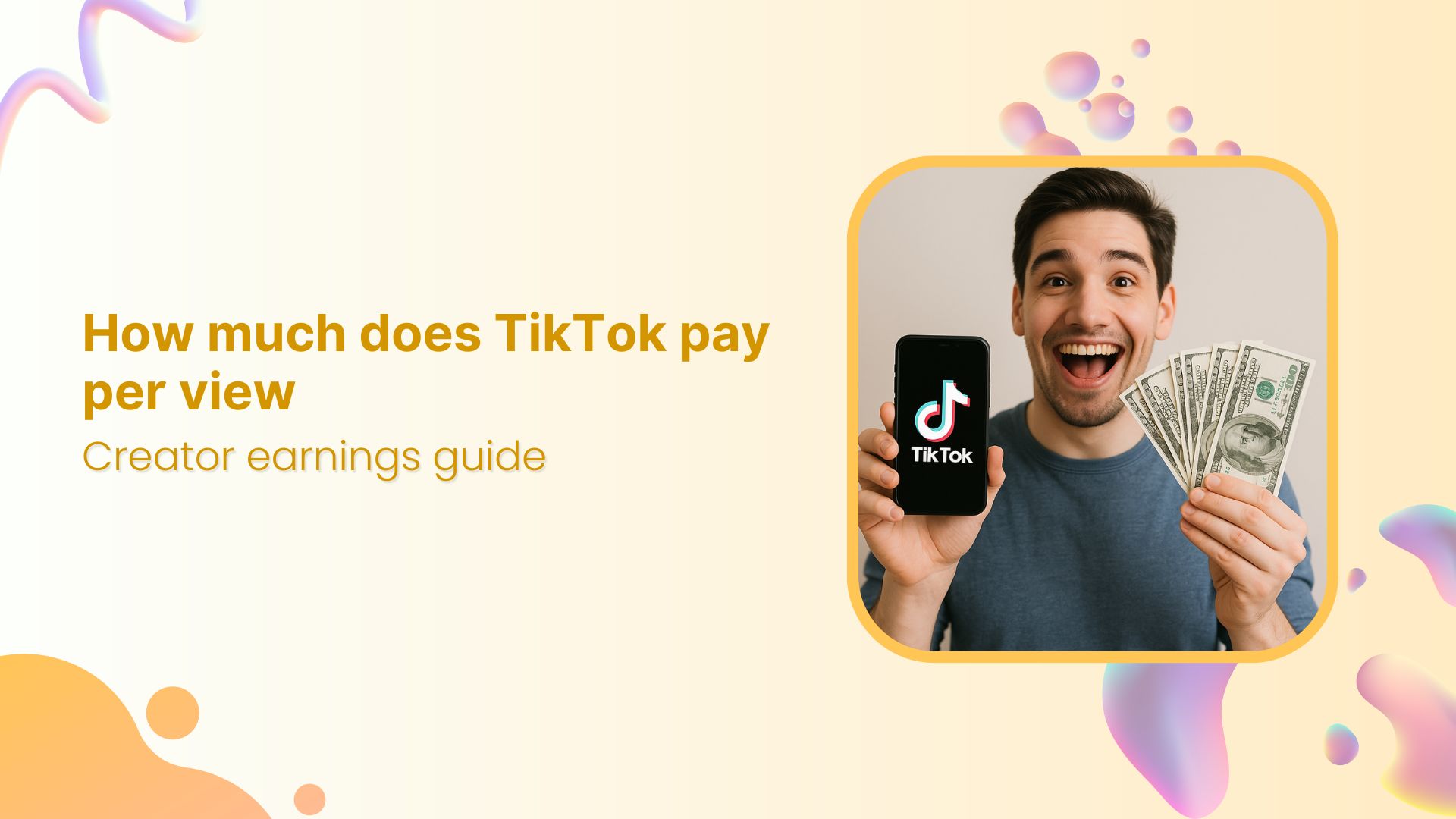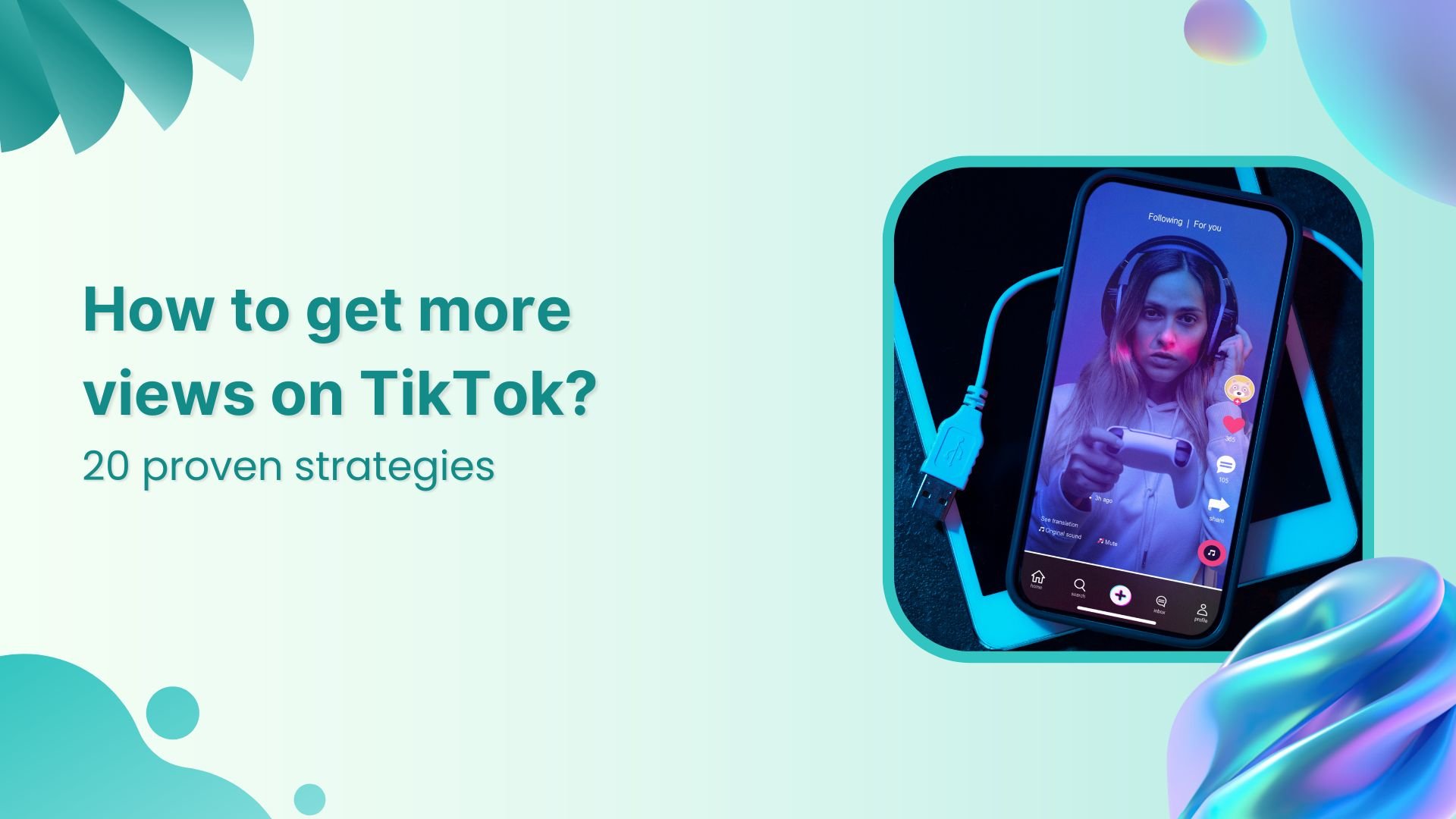Bulk-generate & schedule posts in seconds with Smart Scheduling. Try now!
10 proven social media marketing practices for retail brands
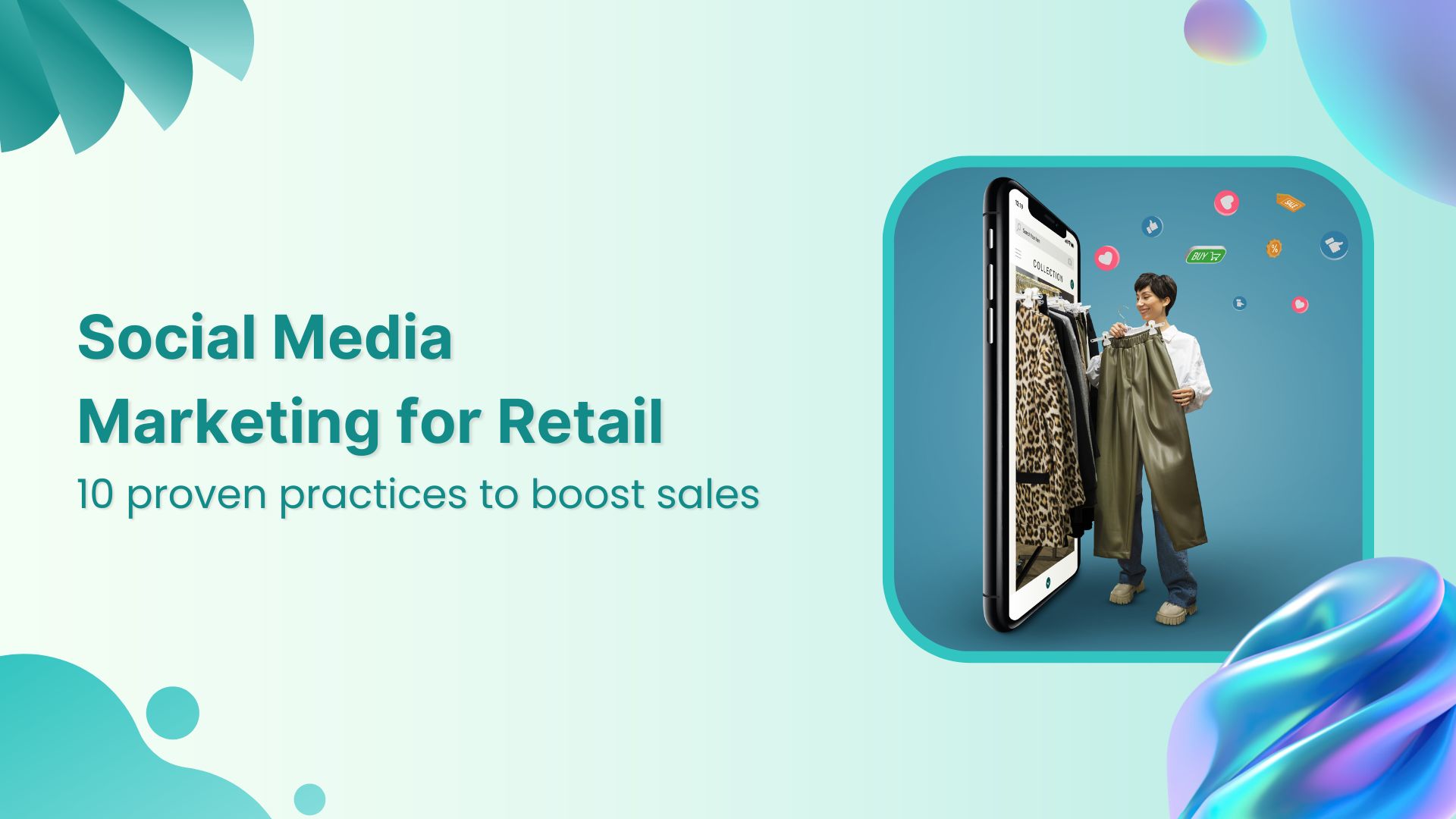
Are retail brands leveraging the full potential of social media in today’s digital landscape?
With nearly 4.95 billion users worldwide engaging on social platforms and e-commerce sales projected to exceed 8 trillion dollars by 2026, the opportunity for retail businesses is immense.
Social media not only facilitates direct engagement with consumers but also influences purchasing decisions, with 23% already following brands they buy from and 21.5% considering new purchases.
In this article, we’ll delve into 10 proven practices of social media marketing for retail brands. We’ll also highlight the best social media marketing tools available for retailers.
Challenges faced by retail brands
Retail brands encounter numerous challenges in today’s competitive landscape. From grappling with the rapid rise of e-commerce to navigating supply chain disruptions and evolving customer expectations, the retail sector faces a myriad of obstacles.
Here are some critical challenges faced by retail brands.
The rise of e-commerce and multichannel shopping
Retail brands are grappling with the challenges posed by the meteoric rise of e-commerce and multichannel shopping. Have a look at the social commerce sales presented by eMarketer.
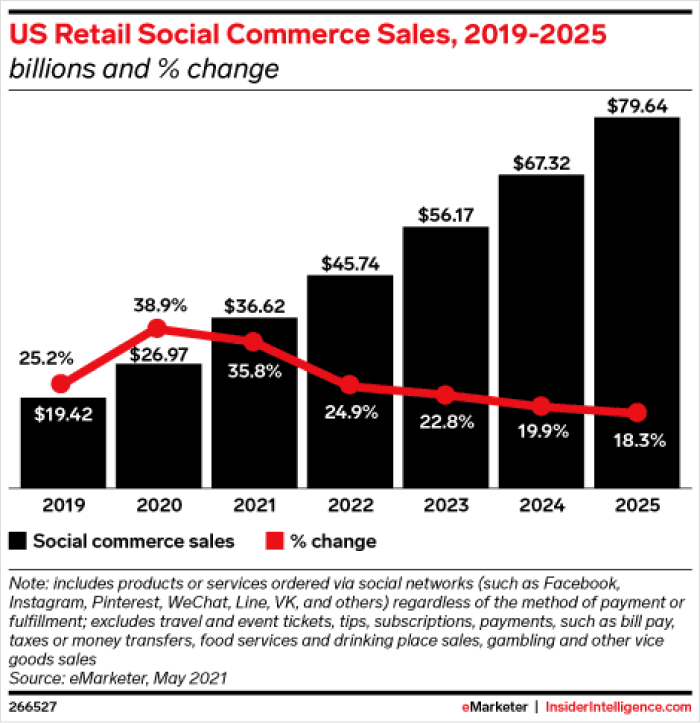
With online shopping becoming increasingly convenient, foot traffic in brick-and-mortar stores is decreasing. To stay relevant, retailers must pivot towards offering a seamless multichannel experience.
This involves integrating physical and online shopping experiences, such as implementing buy online, pick up in-store (BOPIS) options or facilitating hassle-free returns for online purchases at brick-and-mortar locations. Adapting to these changes is imperative for retail brands to retain customers and remain competitive in today’s rapidly evolving market landscape.
Maintaining customer loyalty
In a fiercely competitive landscape, maintaining customer loyalty is a daunting task for retail brands. With a plethora of options available, securing a loyal customer base has become increasingly challenging.
Customers now prioritize various factors such as price, convenience, and unique experiences. To combat this, retailers must devise targeted marketing strategies and implement enticing loyalty programs to keep customers engaged and foster repeat business.
Customer expectations in retail
In today’s dynamic market, meeting evolving customer expectations is paramount for retail success. Modern consumers demand a seamless shopping journey characterized by swift checkout processes, hassle-free returns, and tailored product suggestions. To stay ahead, retailers must allocate resources towards adopting cutting-edge technology and providing comprehensive staff training.
Inventory management
Managing inventory effectively amidst global supply chain disruptions and fluctuating consumer demand poses a significant challenge for retailers. The unpredictability of supply chains can result in stockouts and missed sales opportunities.
To mitigate these risks, retailers are adopting innovative solutions such as real-time inventory tracking and implementing more flexible sourcing strategies.
Data security and privacy
Retail brands are confronted with escalating concerns regarding data security and customer privacy. As vast amounts of customer data are accumulated to tailor shopping experiences, apprehensions about potential breaches are mounting.
To address this, retailers must prioritize implementing stringent cybersecurity protocols and ensuring transparency regarding the utilization of customer data.
Amazon, the e-commerce giant, consistently strengthens its security infrastructure to safeguard user information. It prioritizes data protection and privacy.
Significance of social media marketing for retailers
Social media marketing for retail brands holds significant importance for retailers in today’s digital age. It serves as a powerful tool for enhancing brand awareness and visibility, reaching a wider audience, and fostering customer engagement and interaction.
Through targeted advertising opportunities and influencer collaborations, retailers market their products and services effectively to specific demographics, maximizing their marketing efforts.
The easiest way to manage and grow your social channels.
Try ContentStudio for FREE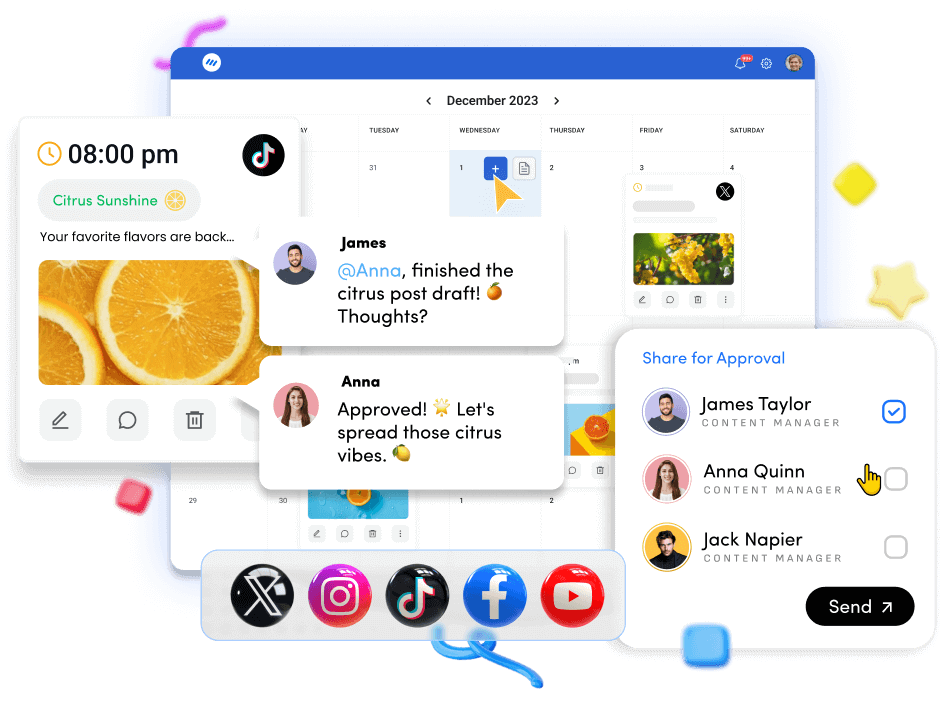
Here are some important factors highlighting the significance of social media marketing for retail brands.
Brand awareness and visibility
Brand awareness and visibility are crucial aspects of social media marketing for retailers. By maintaining a strong presence on platforms like Instagram, Facebook, and Twitter, retailers can increase their visibility among their target audience and enhance brand recognition.
For example, fashion retailer Louis Vuitton utilizes Instagram effectively to showcase its latest collections, engage with followers through captivating visuals, and promote brand awareness globally. Through strategic use of hashtags, sponsored posts, and influencer collaborations, LV ensures that its brand remains at the forefront of consumers’ minds, driving traffic to its stores and website and ultimately boosting sales.

Targeted advertising opportunities
Through social media platforms, retailers are able to precisely target their advertising efforts based on demographics, interests, and behaviours. Through advanced targeting options, retailers can ensure that their ads reach the most relevant audience segments, maximizing the effectiveness of their marketing campaigns.
Customer engagement and interaction
Customer engagement and interaction are essential components of successful social media management for retail brands. By fostering meaningful conversations and interactions with their audience, retailers can strengthen customer relationships and build brand loyalty.
Slack actively engages with its customers on social media platforms like Twitter, responding to comments, addressing queries, and even featuring user-generated content on its official pages.
Peek at the timestamps on Slack’s response in the image below, and you can tell they have a goal of getting back to customers within 2-3 hours:
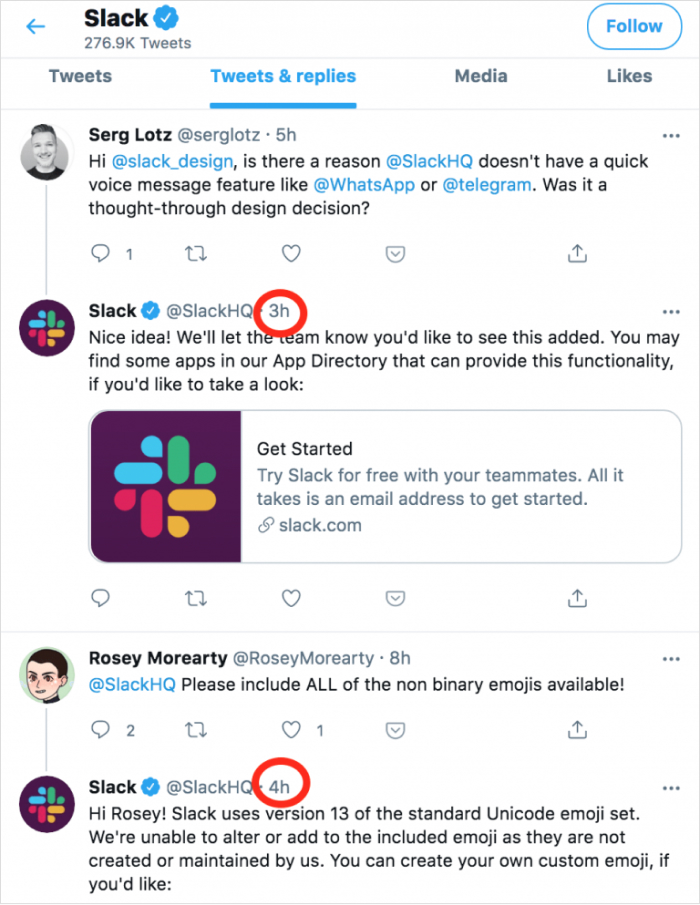
Social Customer Service
Never miss a message or comment from your social media audience. Try ContentStudio’s Inbox.
Get Started for FREE
Influencer marketing collaboration
Collaborating with influencers allows retailers to increase the reach and credibility of popular personalities to promote their products or services. By partnering with influencers whose audience aligns with their target market, retailers can amplify their brand message and drive engagement and conversions.
Customer feedback and insights
Social media provides retailers with valuable insights into customer preferences, opinions, and sentiments. By monitoring comments, reviews, and conversations on social media platforms, retailers can gain actionable feedback and identify areas for improvement.
10 essential social media marketing practices for retail success
Implementing effective social media marketing practices is crucial for achieving success in the retail industry.
Here are 10 essential social media marketing practices for retail success in the dynamic world of social media for retail:
1. Incorporating social media into sales funnel
Integrating social media into the sales funnel involves leveraging platforms to guide potential customers through the buying journey, from awareness to conversion. This retail, social media strategy entails creating tailored content for each stage of the funnel, such as educational posts to attract prospects, engaging visuals to nurture leads, and compelling calls-to-action to prompt purchases.
Clothing retailer ASOS effectively utilizes Instagram to showcase new arrivals (awareness), share styling tips and customer reviews (consideration), and offer exclusive discounts or limited-time promotions (decision).
By strategically aligning social media content and campaigns with each stage of the sales funnel, ASOS effectively nurtures leads, drives engagement, and ultimately increases conversions, contributing to its overall business success.

2. Implementing native social commerce solutions
Setting up native social commerce solutions involves integrating shopping functionalities directly into social media platforms. This allows customers to discover and purchase products without leaving the app.
For instance, Instagram’s “Checkout” feature enables users to buy products showcased in posts or stories without being redirected to an external website. By streamlining the purchasing process and reducing friction, native social commerce solutions enhance the convenience of shopping for consumers while providing retailers with a direct channel to drive sales and increase conversion rates.

3. Adopting an omnichannel social presence
Adopting an omnichannel social presence involves maintaining a consistent brand image and messaging across multiple social media platforms. This retail social media strategy ensures that retailers effectively reach and engage with their target audience across various channels, providing a seamless experience regardless of the platform used.
By embracing an omnichannel approach, social media retailing can maximize their reach, strengthen brand recognition, and cultivate deeper connections with their audience.
4. Supplementing existing marketing campaigns with social media
Utilizing social media to supplement existing marketing campaigns involves incorporating social media platforms to enhance the reach and effectiveness of traditional marketing efforts. This strategy includes leveraging social media channels to amplify campaign messaging, drive traffic to campaign landing pages, and encourage audience engagement.
Coca-Cola often integrates social media into its TV commercials by featuring hashtags or encouraging viewers to participate in social media challenges related to the campaign theme.
By integrating social media seamlessly into broader marketing initiatives, retailers can extend their campaign’s reach, foster deeper engagement, and achieve greater campaign success.

5. Gathering feedback from social customers
Collecting feedback from social customers involves actively soliciting and listening to customer opinions, comments, and suggestions on social media platforms. This practice enables retailers to gain valuable insights into customer preferences, satisfaction levels, and areas for improvement.
Maccosmetics utilizes social media platforms to encourage customers to share their experiences and provide feedback on products and services. By leveraging social media as a feedback channel, retailers can demonstrate responsiveness to customer needs, build trust, and continuously improve their offerings to better meet customer expectations.

6. Providing social customer service
Dedicating time to providing social customer service involves promptly addressing customer inquiries, concerns, and feedback on social media platforms. This practice ensures that customers receive timely assistance and support, enhancing their overall experience with the brand.
For example, Nike has a dedicated customer service team that responds to customer queries and resolves issues raised on platforms like Twitter and Facebook.
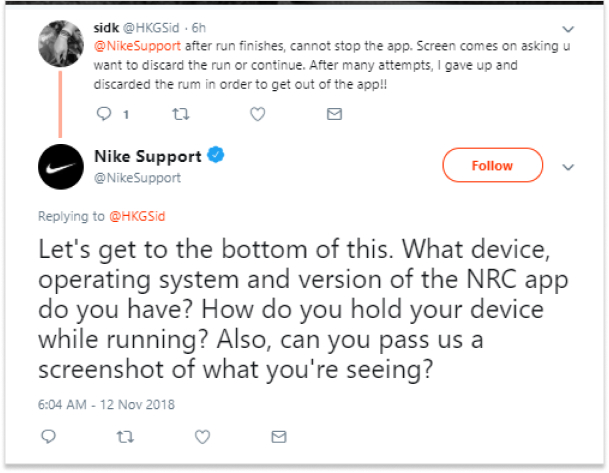
By prioritizing social customer service, retailers can build trust, foster loyalty, and strengthen their relationships with customers, ultimately driving satisfaction and retention.
7. Social media trend monitoring
Listening for trends on social media involves monitoring conversations, hashtags, and discussions to identify emerging topics and consumer preferences. This practice enables retailers to adapt their product offerings and content strategies to align with current trends, ensuring relevance and resonance with their target audience.
By staying attuned to social media trends, retailers can stay ahead of the curve, engage with their audience effectively, and drive business success.
8. Curating user-generated content
Curating user-generated content involves showcasing content created by customers to promote satisfied experiences and brand advocacy. This practice leverages authentic testimonials and visuals to build trust and credibility with potential customers.
GoPro encourages users to share their adventure videos and photos on social media using the hashtag #GoPro, then features the best submissions on its official channels.
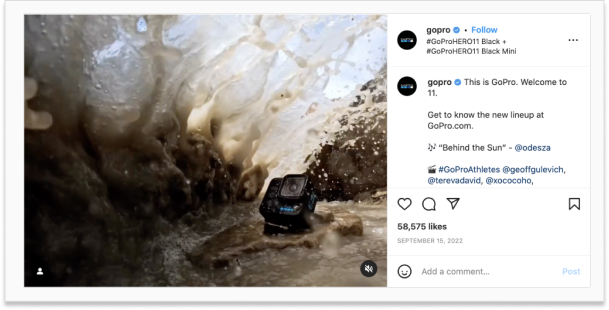
By highlighting real-life experiences and testimonials from satisfied customers, retailers can foster a sense of social media community, inspire engagement, and drive conversions.
9. Streamlining social shopping experience
Making social shopping as seamless as possible involves optimizing the purchasing process directly within social media platforms. This practice eliminates friction by allowing customers to discover and buy products without leaving the app.
For example, Pinterest’s “Buyable Pins” feature enables users to purchase products directly from pinned images, streamlining the path to purchase. By integrating shopping functionalities seamlessly into social media platforms, retailers enhance convenience for customers, increase conversion rates, and capitalize on impulse buying behaviors, ultimately driving sales and revenue.

10. The power of social media analytics
Tracking and analyzing social media metrics is essential for understanding the effectiveness of marketing efforts and making data-driven decisions.
Retailers can monitor key metrics such as engagement rates, click-through rates, conversion rates, and audience demographics to evaluate the performance of their social media campaigns and optimize strategies accordingly.
Top 5 social media marketing tools for retailers
In today’s digital age, social media marketing tools play a crucial role in helping retailers effectively engage with their audience, promote products, and drive sales. From content creation to analytics, these tools offer a range of features tailored to the unique needs of retail businesses.
Here are 5 social media marketing tools for retailers:
1. ContentStudio

ContentStudio is a versatile social media management platform designed to simplify online marketing efforts. With a user-friendly interface, it streamlines tasks such as content creation, scheduling, and analytics across major platforms like Facebook, Instagram, Twitter, TikTok, LinkedIn, and Pinterest. Whether you’re a solo entrepreneur or part of a large enterprise, ContentStudio saves time, enhances work-life balance, and keeps you ahead in your marketing strategies.
Key features:
For retail brands, ContentStudio offers several features tailored to their specific needs:
Social media post composer
ContentStudio’s intuitive post composer empowers retail brands to create compelling content that drives engagement and growth. With robust planning and collaboration tools, marketers can develop posts that align with brand identity and resonate with the target audience.
From product showcases to promotional offers, the composer ensures every post is crafted to captivate and convert potential customers.
AI caption writer
Retail brands can effortlessly generate captivating captions that enhance the impact of their social media posts using ContentStudio’s AI-powered caption writer. By leveraging advanced algorithms, the platform suggests personalized captions that resonate with the brand’s voice and style.
Content curation
ContentStudio enables retail brands to curate a diverse range of relevant content from trusted sources across the web. By sharing industry news, trends, and product updates, brands can position themselves as authorities in their niche and foster deeper connections with their audience.
The platform’s content curation tools streamline the process, allowing marketers to stay informed and engaged with their followers without extensive manual effort.
Social analytics
Gain actionable insights into the performance of retail brand’s social media campaigns with Content Studio’s comprehensive analytics suite.
Track key metrics across multiple platforms, including engagement, reach, and conversions, to understand what resonates with the audience and optimize future marketing efforts.
Automated reports
Simplify reporting and collaboration processes with automated report scheduling feature. Retail brands can pre-schedule detailed analytics reports for easy sharing with internal teams and external stakeholders.
By streamlining the reporting process, marketers can focus more time and energy on strategic decision-making and campaign optimization, ultimately driving better results and ROI for the brand.
TikTok analytics
Unlock the full potential of TikTok for retail brands with TikTok analytics. Gain valuable insights into performance metrics such as views, likes, and shares, allowing brands to understand the impact of their TikTok content and optimize their strategy accordingly.
2. StoreYa

StoreYa is an eCommerce advertising platform powered by AI, assisting online sellers in automating advertising efforts and boosting sales across Google, Facebook, and Instagram. StoreYa’s features benefit retail brands in the following ways:
Key features:
- Drives targeted shoppers to your store with personalized ad campaigns using the Traffic Booster feature.
- Accelerates sales growth by engaging visitors with discounts or promotions through the Coupon Pop feature.
- Compares your shop’s performance to industry giants with the Benchmark Hero feature, providing insights for improvement.
- Creates compelling product descriptions effortlessly with the Product Description Wizard feature, optimizing content to attract and convert shoppers.
- Boosts conversions and encourages repeat purchases by engaging visitors with discounts or promotions through the Coupon Pop feature.
3. Heyday

Heyday focuses on revolutionizing customer interactions through conversational AI. With consumers increasingly preferring chat-based interactions, Heyday seamlessly integrates with social media platforms, turning them into virtual storefronts for browsing, purchasing, and post-sale support.
Key features:
- Offers constant support through virtual assistants, aiding with tasks such as order tracking and product suggestions.
- Seamlessly integrates with social media platforms, turning them into virtual stores for browsing, buying, and post-sale assistance.
- Enables retailers to provide personalized experiences, enhancing customer satisfaction and loyalty.
- Streamlines order processing, ensuring efficient transactions and customer purchase handling.
- Provides valuable data analytics and insights, helping retailers understand customer behavior, preferences, and trends.
4. Sparkcentral by Hootsuite

Sparkcentral by hootsuite simplifies customer care by centralizing conversations from various support channels, including social media networks and messaging services. Retailers can manage interactions seamlessly, ensuring timely responses and personalized experiences for their customers.
Key features:
- Automates responses to common inquiries, reducing response time and providing customers with quick resolutions.
- Routes customer inquiries to the most appropriate agent or department based on the nature of the query, ensuring efficient handling and resolution.
- Integrates seamlessly with e-commerce platforms, allowing retailers to access customer order history and provide personalized support.
- Monitors customer interactions in real-time and provides analytics to track key metrics such as response time, resolution rate, and customer satisfaction.
- Supports multiple languages, enabling retailers to engage with a diverse customer base effectively and provide support in customers’ preferred languages.
5. Shopview

Shopview simplifies social media marketing for retail brands, whether managing a small boutique or a large e-commerce store. It seamlessly integrates with Hootsuite, enabling you to view products directly within the dashboard and monitor your catalog effortlessly. Share products across multiple social networks like Instagram, Facebook, Twitter, TikTok, Pinterest, and LinkedIn from one place. Organize product streams by collections or keywords for targeted campaigns.
Key features:
- Seamlessly integrate with Hootsuite to view products directly within the dashboard.
- Effortlessly share products from Shopify to various social media channels like Instagram, Facebook, Twitter, TikTok, Pinterest, and LinkedIn.
- Organize product streams by collections or apply keyword filters for targeted campaigns.
- Easily switch between different online stores within Hootsuite for streamlined social media management.
- Add up to 5 team members for efficient collaboration and grant access to store and product streams.
Wrapping up
Implementing effective social media marketing practices is crucial for retail brands to thrive in today’s competitive landscape. By leveraging platforms like ContentStudio, retailers can streamline their online presence and enhance engagement with customers. From creating captivating content to analyzing performance metrics, tools like ContentStudio offer a comprehensive solution tailored to the needs of retail businesses.
By following proven strategies such as utilizing user-generated content, optimizing for mobile, and leveraging influencer partnerships, retail brands can effectively connect with their target audience and drive sales. With the right tools and practices in place, retailers can establish a strong online presence and achieve sustainable growth in the digital era.
Simplified social media marketing for individuals & agencies.
Try ContentStudio for FREE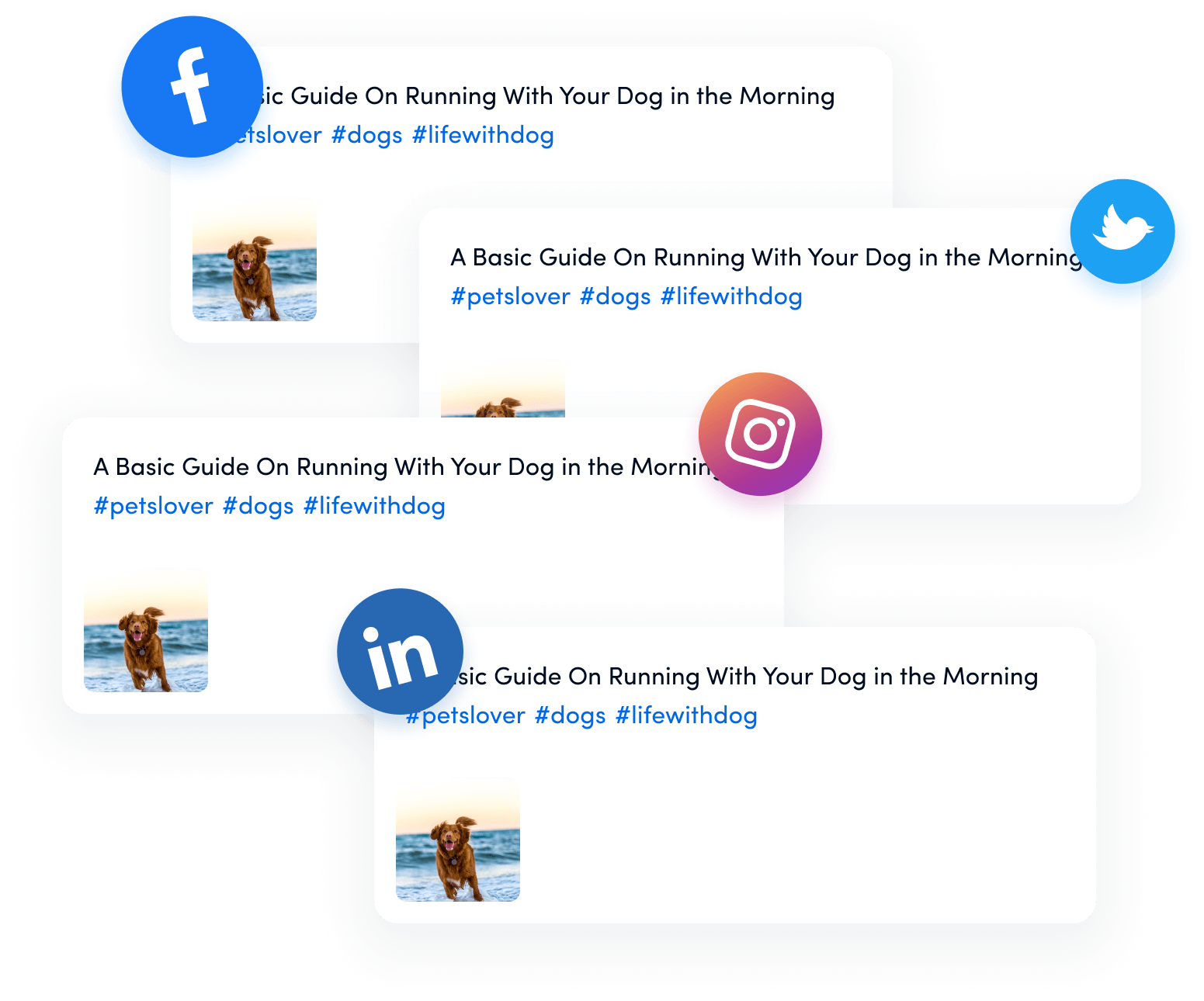
FAQs
What is social retail marketing?
Social retail marketing is the practice of using social media platforms to promote and sell products or services offered by retail brands, engaging with customers, building relationships, and driving sales through platforms like Facebook, Instagram, Twitter, and others.
What are the social media trends in retail?
Current social media trends in retail include the rise of social commerce, video content marketing, influencer collaborations, user-generated content, and the adoption of augmented reality (AR) and virtual reality (VR) technologies for immersive shopping experiences.
How do you market retail on social media?
To market retail on social media, focus on creating engaging content showcasing products, leveraging influencer partnerships, running targeted ads, and engaging with your audience through regular posts and promotions. Ensure consistency in branding and messaging across platforms to build brand recognition and trust among followers.
Recommended for you


Powerful social media management software
14-day free trial - No credit card required.
